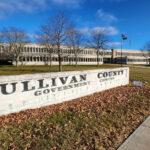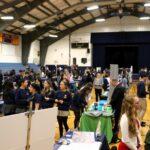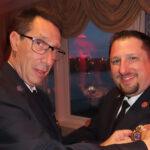VALHALLA – The Hudson Valley will be in the path of Monday’s solar eclipse, which has created quite a buzz locally.
The eclipse should be able to be seen starting at 2 p.m. until about 4:30 p.m. with peak viewing occurring at about 3:20 p.m. SUNY Orange and SUNY New Paltz will host solar viewing events.
Dr. Max Schlesinger, MD, a Westchester Medical Center Health Network ophthalmologist and retina specialist, said residents should prioritize eye safety during this extraordinary event.
A solar eclipse occurs when the moon passes between the Earth and the sun, momentarily blocking our view of the sun. Even during partial eclipses, the sun emits harmful ultraviolet (UV) rays. Gazing directly at the sun during an eclipse can lead to severe damage to the retina’s cells, resulting in permanent vision loss or even blindness.
“The eye’s natural defenses—such as blinking and pupil constriction—are compromised during an eclipse due to the sun’s reduced brightness,” Dr. Schlesinger said. “It’s crucial to avoid direct sun exposure without proper eye protection.”
Dr. Schlesinger offered the following tips for viewing the eclipse.
You Should:
- Use Certified Solar Eclipse Glasses: Invest in specially designed solar eclipse glasses or viewers that meet international safety standards. These glasses effectively filter out harmful UV rays, allowing you to observe the eclipse safely.
- Inspect Your Eclipse Viewers: If you’ve had eclipse viewers for more than three years or notice any scratches, damage, or defects, discard them. Reliable viewers are essential for eye protection.
- Keep Your Eclipse Glasses On: Even brief exposure to the sun during the eclipse can harm your eyes. Wear your eclipse glasses consistently to safeguard your vision.
You Should Not:
- Stare Directly at the Sun: Regardless of the eclipse’s visibility, avoid looking directly at the sun without proper eye protection. The risks are real, and protecting your eyes is paramount.
- Avoid Homemade Filters: Homemade filters, such as sunglasses or unverified materials, do not provide adequate protection. Stick to certified eclipse glasses or viewers.
SUNY Solar Eclipse Viewing Events on Monday, April 8th
SUNY Orange’s free event will be held from 2 to 4:30 p.m. at the Rowley Center for Science and Engineering, located at East Conkling Avenue in Middletown. Glasses will be available, but attendees are encouraged to bring their own.
The public viewing part at SUNY New Paltz will begin at 1:45 p.m. at the Old Main Quad. A limited number of eclipse glasses will be available. There will be several telescopes with solar filters operated by astronomy students and faculty for local residents to see the eclipse up close.








